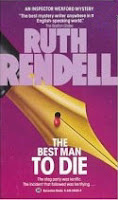 The title is literal; the night before he was due to be best man at his best mate’s wedding, Charlie Hatton is bludgeoned to death with a river stone while on his way home from the pub. But that’s only the start of the mystery. Hatton was a lorry driver who lived beyond his means. It soon becomes apparent that he was party to a couple of recent hijackings, but there’s an influx of cash that doesn’t correspond to any instance of highway robbery. Then there’s Dorothy Fanshawe, sole survivor of the car crash that killed her husband and daughter. Or not - she insists her daughter is alive and in Germany. So who was the girl whose body was found with the wreckage and how did she come to be there? Why can’t Detective Chief Inspector Wexford shake the feeling that the cases are somehow connected? And is it really only coincidence that Charlie Hatton was killed immediately after Dorothy Fanshawe regained consciousness?
The title is literal; the night before he was due to be best man at his best mate’s wedding, Charlie Hatton is bludgeoned to death with a river stone while on his way home from the pub. But that’s only the start of the mystery. Hatton was a lorry driver who lived beyond his means. It soon becomes apparent that he was party to a couple of recent hijackings, but there’s an influx of cash that doesn’t correspond to any instance of highway robbery. Then there’s Dorothy Fanshawe, sole survivor of the car crash that killed her husband and daughter. Or not - she insists her daughter is alive and in Germany. So who was the girl whose body was found with the wreckage and how did she come to be there? Why can’t Detective Chief Inspector Wexford shake the feeling that the cases are somehow connected? And is it really only coincidence that Charlie Hatton was killed immediately after Dorothy Fanshawe regained consciousness?
It’s probably just as well this book was so short (under 200 pages) because I never really warmed to any of the characters. This was an early book, nearly forty years old; I’m struggling to remember the later Wexford mysteries I’ve read, and whether he was that perpetually cranky in those too. Fortunately once the action got going on the two mystery plots, I had something to entertain me to the end.
Rating: C











3 comments:
I think I have a Ruth Rendell book in my TBR room . . . The one word I've heard most often used to describe her books is "different". Do you find that to be true? I'm never sure if that's good or bad. :-) It just came to me! Crocodile Bird. That's the one I have.
"Different" is a good way to describe her non-Wexford novels, Crocodile Bird included, which I find is usually a good thing. If you really want different, try Talking to Strange Men - at least I think that's the title of the book I'm thinking of. All those library books can be so hard to keep track of!
Ooo! Another book to add to my wish list! I'll give Talking to Strange Men a try. Thanks for the recommendation!
Post a Comment